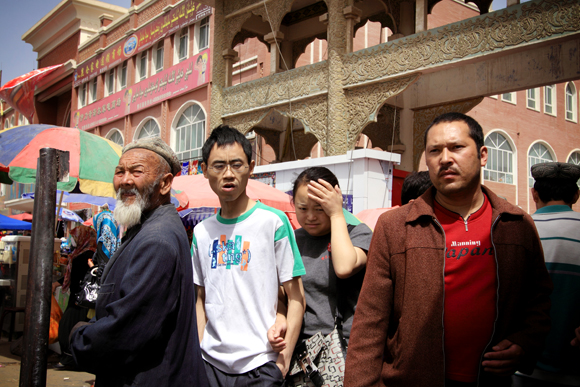 Gheyret Niyaz a 51-year-old journalist was accused of criticizing the Chinese authorities in Xinjiang in an interview in the Hong Kong news weekly, Yazhou Zhoukan, in July 2009 in which he supported the official version of events that implicated external agents in the rioting, saying that the Islamic Liberation Party, Hizb-ut-Tahrir al Islami, was behind them.
Gheyret Niyaz a 51-year-old journalist was accused of criticizing the Chinese authorities in Xinjiang in an interview in the Hong Kong news weekly, Yazhou Zhoukan, in July 2009 in which he supported the official version of events that implicated external agents in the rioting, saying that the Islamic Liberation Party, Hizb-ut-Tahrir al Islami, was behind them.
Sentenced for interview
In that interview, Niyaz discussed his efforts to alert the authorities in Xinjiang Uyghur Autonomous Region (XUAR) about the possibility of trouble the day before the outbreak of the violent ethnic conflict in Urumqi on July 5, 2009. In the interview, Niyaz said that the authorities took no action to prevent the outbreak, despite Niyaz’s repeated warnings.
Reshalaiti, Niyaz’s wife who attended the trial, said her husband maintained that he was performing the duty of a citizen and journalist in talking to the Hong Kong weekly.
Niyaz speaks and writes mainly in Chinese, and is widely regarded as a moderate voice who advocates greater understanding between the Han and Uyghur people. Niyaz has worked at two state-controlled publications, as a former director of Xinjiang Legal Daily and a journalist at the Xinjiang Economic Daily.
He also contributed to the website Uighurbiz.cn, a bilingual forum on Uyghur life and culture that the government accused of inciting violence by posting news about  clashes between Uyghurs and Han Chinese in another region of the country.
clashes between Uyghurs and Han Chinese in another region of the country.
Draconian measure
“In the context of the prolonged news blackout and strict information control in the XUAR following the violence in July 2009, Niyaz’s draconian prison sentence raises serious concern about the authorities’ respect for freedom of expression, and capacity and commitment to protect fundamental rights and freedoms,” said Sharon Hom, executive director of Human Rights in the People´s Republic of China.
Reuters says, that the sentence is unusually long for someone who has a low international profile and apparently did not face charges of separatism or violent extremism. the People´s Republic of China says it faces a threat from radical groups fighting for Xinjiang independence.
When well-known dissident Liu Xiaobo was given an 11-year sentence for subversion last Christmas Day, rights groups roundly condemned that as harsh.
Gheyret Niyaz was arrested in October 2009 following ethnic unrest in Xinjiang in July 2009 and found guilty of “threatening national security” after criticising Chinese official policy towards the Uyghurs, sending news about the riots to foreign journalists and contributing to a website accuse d of inciting violence.
d of inciting violence.
Authorities put control of news above reconciliation
“We are utterly astonished at the outcome of this trial,” the Reporters Without Borders said. “Gheyret Niyaz did indeed make some criticism of Chinese policy in his region, but he is neither a criminal nor a dissident. He is seen by Uyghurs based abroad as supporting China’s administration of Xinjiang and even shares some of the Chinese government’s views of the summer 2009 unrest.
“In giving him such a heavy sentence and imprisoning other journalists and netizens whose sole crime is to have spoken about these events, the Chinese authorities are not encouraging a negotiated solution. On the contrary, this shocking sentence shows that the authorities put control of news above the reconciliation process. Prisoners of opinion should be released and the verdict against Gheyret Niyaz quashed on appeal”, the organisation added.
Six months without internet
the People´s Republic of China cracked down on the Internet as it restored order in the region hit by the disorder of last summer. Access to the Chinese Internet was cut for six months from July 2009 then gradually re-established between January and May this year. Reporters Without Borders in October 2009 carried out an investigation into access to websites relating to the Uyghur community that found more than 85% of the 91 websites surveyed were blocked, censored or otherwise inaccessible.
Bloggers, netizens and website managers have been singled out for repression. Gheyret Niyaz is not the only one in detention. Dilshat Parhat, co-founder of the Uyghur website Diyarim, Nureli, creator of the Uyghur website Selkin, Muhemmet, director of a Uyghur website and Obulkasim, a contributor to Diyarim, all remain in prison.
Parhat, co-founder of the Uyghur website Diyarim, Nureli, creator of the Uyghur website Selkin, Muhemmet, director of a Uyghur website and Obulkasim, a contributor to Diyarim, all remain in prison.
At least 30 journalists and 76 netizens are currently behind bars in the People´s Republic of China and Reporters Without Borders repeats its call for their unconditional release.
HRH Oslo, this article is based on information published at www.phayul.com (see article here), Reporters Without Borders website (see article here) and Reuters (original article here).
Related links:
China unable to tackle instability in Western Region, say Uyghur exile groups





